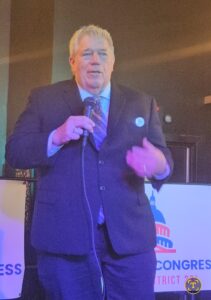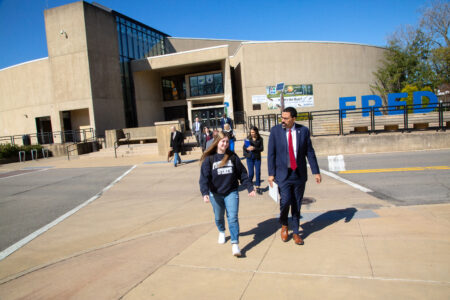Professor Talks ‘Election Post-Mortem’
Jonathan Chausovsky, an associate professor at the State University of New York at Fredonia, shared his take on “The Day After Hangover: An Election Post-Mortem,” as he called it.
The college hosts a monthly Brown Bag Lunch Series, which holds different themes every year and different topics every month. Each meeting, a guest speaker or professor gives a presentation on a topic that pertains to relevant happenings that relate to the theme of the year.
On Wednesday, a presentation by Chausovsky was given to discuss what happened on Election Day, what results were currently known at the time, feasibility of Joe Biden winning, restrictive voting laws in place prior to Election Day, and to discuss legal challenges.
At the time of the meeting, Chausovsky said that “Biden is likely the winner, but it is far from certain.”
“The pathologies of the United State are unmistakable to me,” he said. “It’s really quite clear. We have a president who is quite frankly, in many ways, pathological, who makes things up and expects people to believe them. … The way he has handled the pandemic is atrocious and the amazing thing is that many Americans don’t think so. And the fact that many Americans don’t think so is really astonishing to me.”
Besides discussing the president and Biden, Chausovsky presented in the meeting some various voting restrictions in the country that may hamper unfavorable votes, according to the Republican party. These restrictions, according to Chausovsky, include changing boundaries, moving poll locations, Gerrymandering, requiring IDs to vote, changing hours and dates of early voting and changing or lessening the hours to vote on Election Day.
“(Texas) passed a law requiring voter identification in 2011,” he said. “They knew there were some 600,000 registered voters that did not have one of these forms of ID. Under this law, gun licenses were acceptable, but student IDs were not.”
According to Chausovsky, this election in Texas, the secretary of state mandated one ballot drop box per county, regardless of size or population.
“If you had a large, rural district, you could take hours to drive to that drop box,” he said. “On the other hand, if you live in Harris County, which is Houston, you’ve got several million people using one drop box. That’s a way of restricting voters.”
Chausovsky went on to discuss many other states that passed laws in the past that may hamper “unfavorable voters,” including North Carolina, Florida and Wisconsin. In Wisconsin, many Department of Motor Vehicle locations were closed in black neighborhoods, mostly in Milwaukee. From 2012 to 2016, black voter turnout fell by 19%, while white voter turnout dropped by only 2%.
Chausovsky then moved on to discuss a book, which spoke about “stupidities of the Constitution.”
“There’s a lot of them, as a result, but one of them is certainly the Electoral College,” he said. “He (the author) said, this is incredibly stupid if we have a circumstance where the wrong person wins and by the wrong person, he means the person who doesn’t get the most votes. He thought that if that happens, it’ll cause a crisis and we’ll have to change it. Well, this will be the third time since 1998, if Trump manages to win. The Electoral College needs to go.”
When asked about the inevitable divisiveness that the country is going to face in the coming weeks, no matter who is elected, Chausovsky explained that he fears for the next several weeks because, “When it’s one state or two states that are at issue, it becomes easier for those who wish to become militant to do so because they have a focal point, so that concerns me as well. I don’t know where we go with this. We are divided. The last time we were this divided, we had a civil war.”





